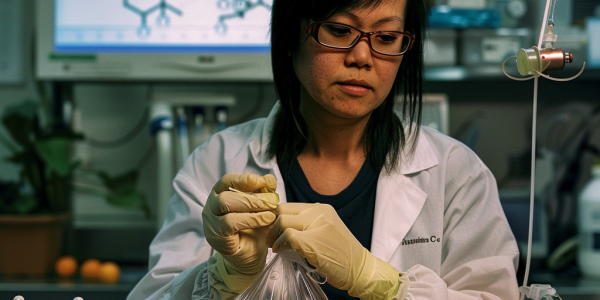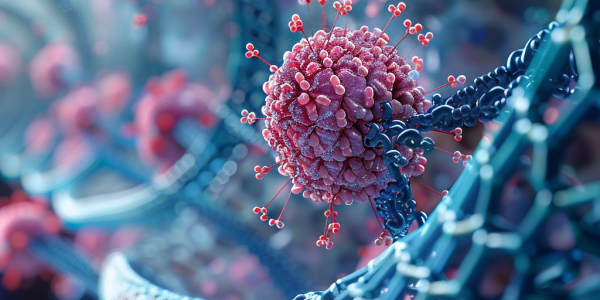University of Iowa Study Reveals High-Dose Vitamin C Doubles Survival Rates for Late-Stage Pancreatic Cancer Patients
A groundbreaking study from the University of Iowa reveals that high-dose intravenous vitamin C therapy could double survival times for late-stage pancreatic cancer patients, increasing their average survival from eight to 16 months. This promising research highlights the potential of vitamin C as a versatile treatment option in oncology, with implications for other cancer types as well.
SARAH Trial Reveals Heart Failure Drug’s Promise in Reducing Cancer Treatment Risks
A recent study presented at the 2024 AHA Scientific Sessions revealed that sacubitril/valsartan can significantly reduce the risk of cardiomyopathy in cancer patients undergoing anthracycline chemotherapy, with a remarkable 77% reduction noted in the SARAH trial. This research highlights the importance of protecting heart health in high-risk cancer patients, paving the way for safer treatment protocols and improved patient outcomes.
MIT Researchers Unveil Dual-Action Cancer Therapy Combining Phototherapy and Chemotherapy
MIT researchers have developed a groundbreaking dual-action cancer therapy that combines phototherapy and chemotherapy into a single implant. This innovative approach aims to enhance treatment effectiveness while minimizing side effects for patients with advanced tumors. Early studies show promising results, potentially paving the way for more personalized and effective cancer treatments.
Exercise Reduces Nerve Damage from Chemotherapy, Study Finds
A recent study by researchers from the University of Basel and the German Sport University Cologne found that physical exercise can significantly reduce nerve damage during chemotherapy treatments. Patients who engaged in exercise alongside their chemotherapy experienced a 50 to 70 percent reduction in nerve damage, leading to improved quality of life and lower mortality rates. Integrating simple exercises into cancer treatment regimens may help mitigate side effects and enhance post-treatment recovery for patients.
Innovative Nanocage System for Sustainable Cancer Drug Delivery Developed by Researchers
Researchers have developed an innovative nanocage system for sustainable cancer drug delivery, utilizing proline and metals like palladium to target tumors while minimizing side effects. This novel method could revolutionize drug delivery by offering a more precise and adaptable approach compared to traditional methods, potentially replacing faulty enzymes in the body and reducing inflammation levels.
Study Finds Elevated Risk of Joint Infection After Chemotherapy Following Joint Replacement Surgery
Recent study suggests that individuals who undergo joint replacement surgery and later receive cancer chemotherapy may have an elevated risk of joint infection. Dr. Janet Conway’s research highlights the importance of understanding factors contributing to postoperative infections and the need for further investigation to protect joint replacement patients. Stay informed and proactive to mitigate the risk of joint infections following chemotherapy post joint replacement surgery.
Chinese Scientists Make Groundbreaking Discovery in Pancreatic Cancer Treatment
Chinese scientists have discovered two protein markers that may predict chemotherapy sensitivity in pancreatic cancer, offering hope for improved survival rates. The groundbreaking study, published in Nature Medicine, could revolutionize the diagnosis and treatment of the most common subtype of pancreatic cancer, offering new hope for patients and the medical community.
Researchers Discover Enzymes that Impact Effectiveness of Chemotherapy Drug in Treating Pancreatic Cancer
University of Toronto researchers have discovered enzymes that hinder the effectiveness of gemcitabine, a common chemotherapy drug used to treat pancreatic cancer. The study, published in Nature Cancer, sheds light on the mechanisms compromising gemcitabine’s efficacy and offers potential for the development of targeted therapies to improve treatment outcomes for pancreatic cancer patients.
Secondhand Smoke Reduces Effectiveness of Cancer Treatment, Study Finds
Exposure to secondhand smoke during chemotherapy can reduce the effectiveness of cancer treatment, as revealed by a study from the University of Oklahoma Health Sciences. The research, focused on head and neck cancer, found that cells exposed to secondhand smoke required twice as much chemotherapy to be eliminated, highlighting the significant impact of secondhand smoke on treatment outcomes.
New Clinical Trial Shows Promise in Treating Certain Types of Mesothelioma
A recent clinical trial has shown promising results in the treatment of certain types of mesothelioma, a rare and aggressive form of cancer. The trial focused on a novel type of chemotherapy called pegargiminase, which has been found to improve the survival rates of patients with biphasic and sarcomatoid mesothelioma. The addition of pegargiminase to the standard chemotherapy treatment for nonepithelioid mesothelioma cases has emerged as a promising new approach, targeting tumors that lack argininosuccinate synthetase (ASS) expression. The results of this clinical trial represent a significant advancement in the treatment of mesothelioma, particularly for patients with biphasic and sarcomatoid cell types.










